A source for sharing stories of inclusion and belonging, bold activism and local change-makers in action.
The mission of this platform is to amplify diverse voices and “good news” stories from within the disability community in Snohomish County and across the region.
*The Arc Amplified is an online publication of The Arc of Snohomish County. Learn more about our mission and values at arcsno.org/about
Do you have a story of inclusion you want to share?
Are you leading local advocacy efforts? Has your family or loved one benefited from activities or programs in Snohomish County that are designed to advance community inclusion?
We want to know!
Send an email to:
Courtney Criss
Leadership & Advocacy Program Manager
Courtney@arcsno.org
or call (425) 258-2459 x 106.
Meet Sara Carmen
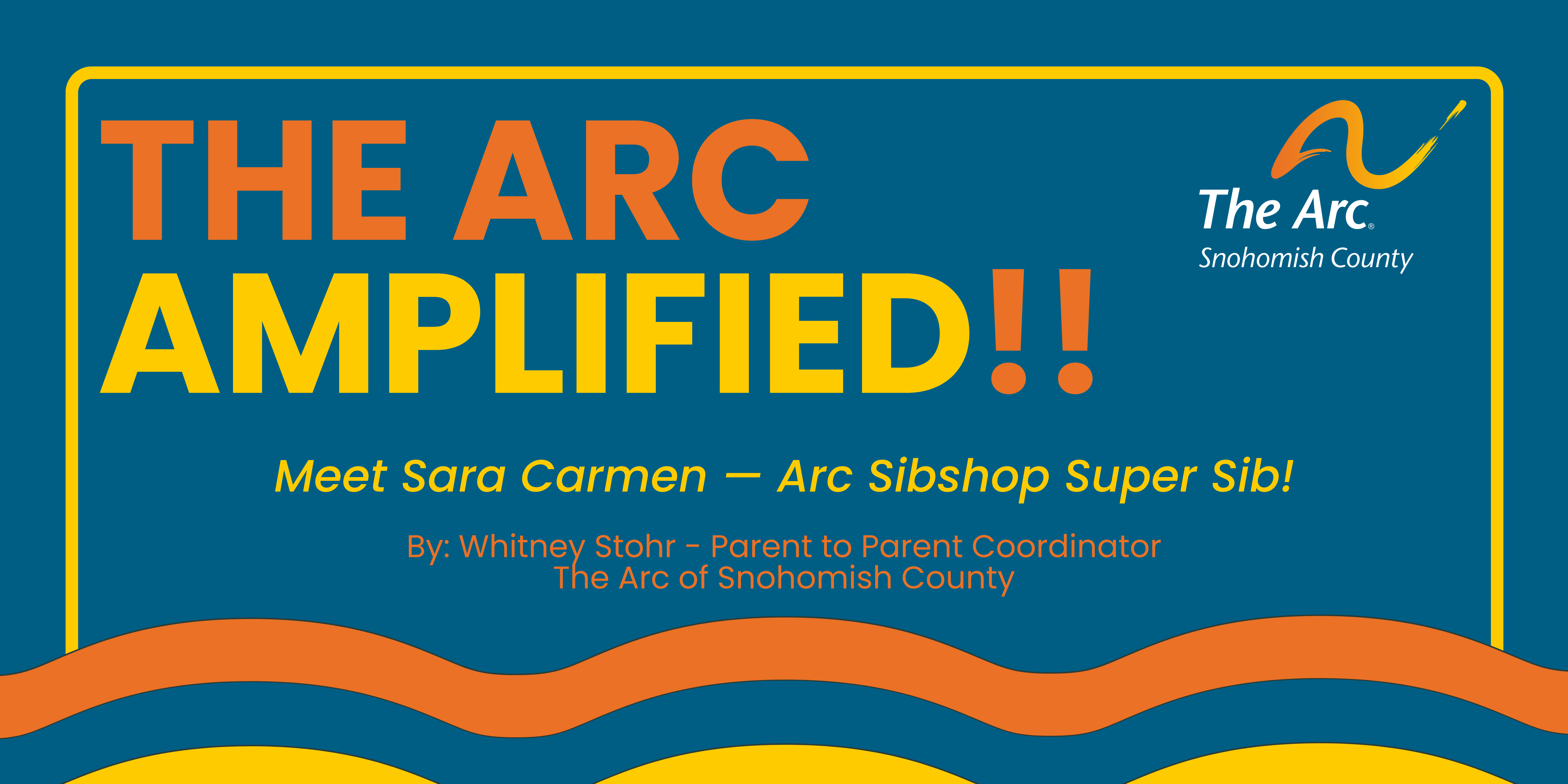
Meet Sara Carmen — Arc Sibshop Super Sib!
Meet Sara Carmen — one of our SUPER SIBS at The Arc of Snohomish County!
Sara lives in Snohomish County with her two sisters, her mom and dad, and the family’s two dogs. One of her sisters experiences developmental disabilities.
In her free time, Sara likes to listen to music and sketch. She describes both music and art as a way to “have her own space.” For her, it is a way of setting her own boundaries, “resetting her brain,” and going over things in her head. She shared: “[My sister] knows that when I’m listening to music, it’s my time.”
(What a wonderful example of how essential it is for all of us to set aside time for self-reflection and to know what we need for ourselves as we sort through our thoughts and feelings and take the time to “reset” our own minds. Thank you, Sara, for sharing that insight.)
Sara is currently in the ninth grade and enjoys attending online school.
When asked about her future “dream job,” she shared: “For a long time, it was to be a singer. But I’ve kind of moved to a different point. Right now, I would like to try to become a Home Care Aid.”
She wants to support people with disabilities, who are living in the community. She is also teaching herself American Sign Language (ASL) by watching YouTube videos. She is a natural leader and educator.
“In 3rd grade, I used to go to public school and would go to the Life Skills Class to hang out during lunch,” she elaborated. “I knew all the kids there; all of their names and their disabilities, and all of their teachers. I learned stuff about the kids.”
They quickly became friends, and Sara shared stories of times when she raised awareness about disabilities and stuck up for her friends against bullying. She often stands up for her sister, too, as well as others.
“I’ve always had feelings that every kid needs to be treated the same,” she said.
***
The Arc of Snohomish County’s Sibshop program is a specially tailored program for children, ages 8 to 12, and teens, ages 13 to 18, who have siblings with developmental disabilities. (Learn more about the national Sibshop program at siblingsupport.org.)
Sara has attended Sibshops for some time. She talked about how nice it is to meet other youth who share the experience of having a sibling with developmental disabilities. She enjoys talking to other siblings as it provides her an opportunity to learn about other types of disabilities and to connect with other kids who understand some of her feelings.
One of her favorite Sibshop activities is completing the ropes course and zipline at High Trek Adventures in Everett. She also enjoys the art activities and will sometimes submit the artwork she completes at Sibshops to display in the youth art exhibit at the Evergreen State Fair.
Sara even acts as an unofficial community ambassador for Arc Sibshops. When she meets other siblings of kids with disabilities, she makes certain to tell them about The Arc and how much FUN you can have at Sibshops. She encourages them to participate and shares that Sibshops might be a way for them to “find friends that know how they feel and what they are going through at home.”
Thank you very much, Sara, for helping us get the word out to all of the amazing Sibs in Snohomish County! You are quite the Super Sib yourself!
**********
Whitney Stohr is a Parent to Parent Coordinator at The Arc of Snohomish County. She is passionate about advocating for medically complex children and children with disabilities and their families. She is a mom and medical caregiver herself, who is energized by working closely with other parent/family caregivers. She lives with her four-year-old son Malachi and husband Jason in Lynnwood. Connect with her on Instagram @rollin.w.spinabifida. Contact: whitney@arcsno.org.
READ-ALOUD: The Peace Book
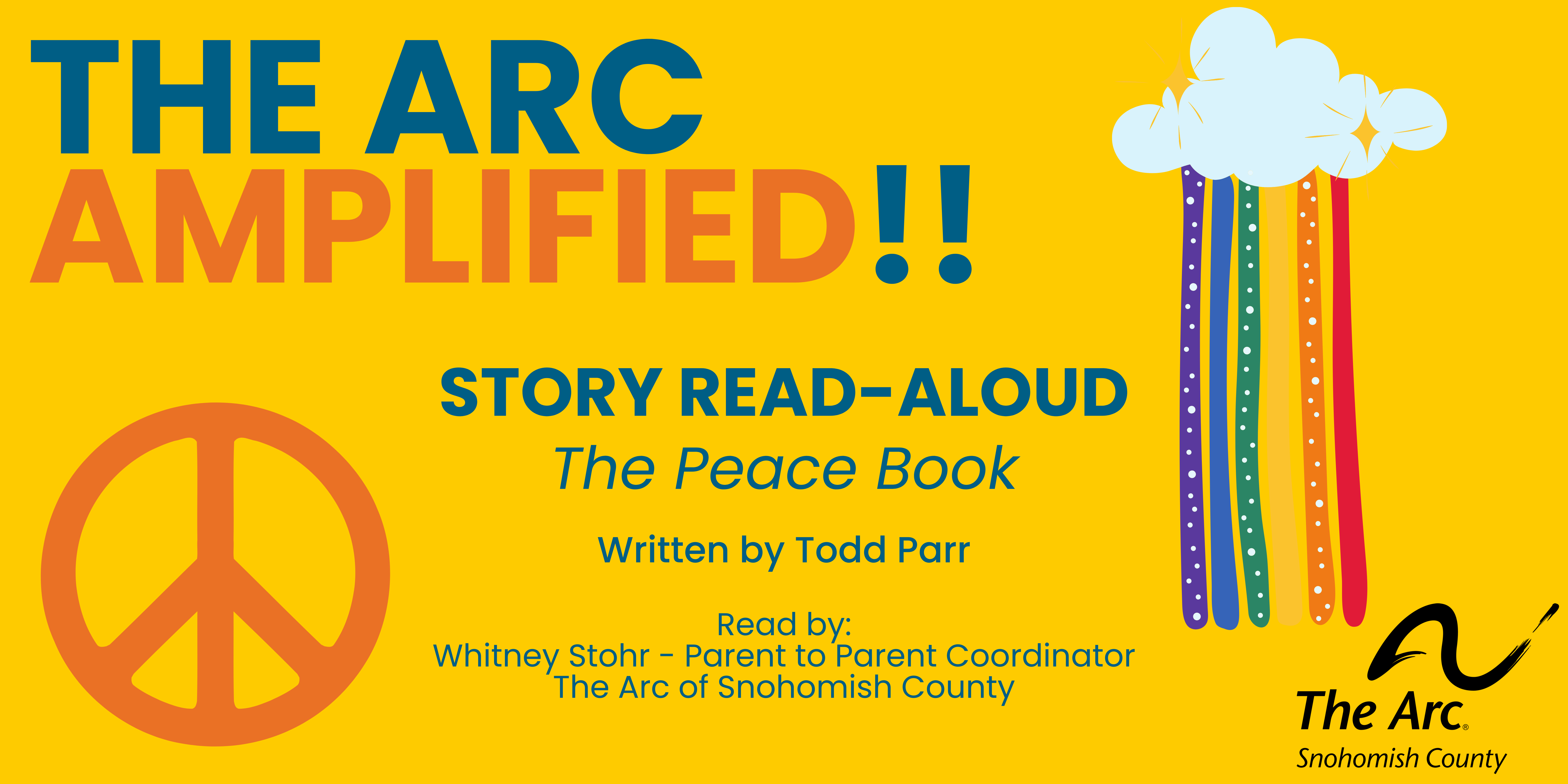
READ-ALOUD: The Peace Book
What is PEACE? Peace is making new friends. Peace is keeping the water blue for all the fish. Peace is listening to different kinds of music. Peace is saying you’re sorry when you hurt someone. And peace is so, so much more!
The Peace Book inspires kids (and adults!) with universal sentiments of compassion and hope. It delivers positive and hopeful messages of peace and a timeless message about the importance of friendship, caring and acceptance. (Read more at tinyurl.com/2mpvrn76).
Join Whitney Stohr, Parent to Parent Coordinator at The Arc of Snohomish County, as she reads: The Peace Book, by Todd Parr (published 2009 by Megan Tingley Books / Little, Brown and Company, New York).
LEADERSHIP NEWSLETTER 2022, ISSUE 1
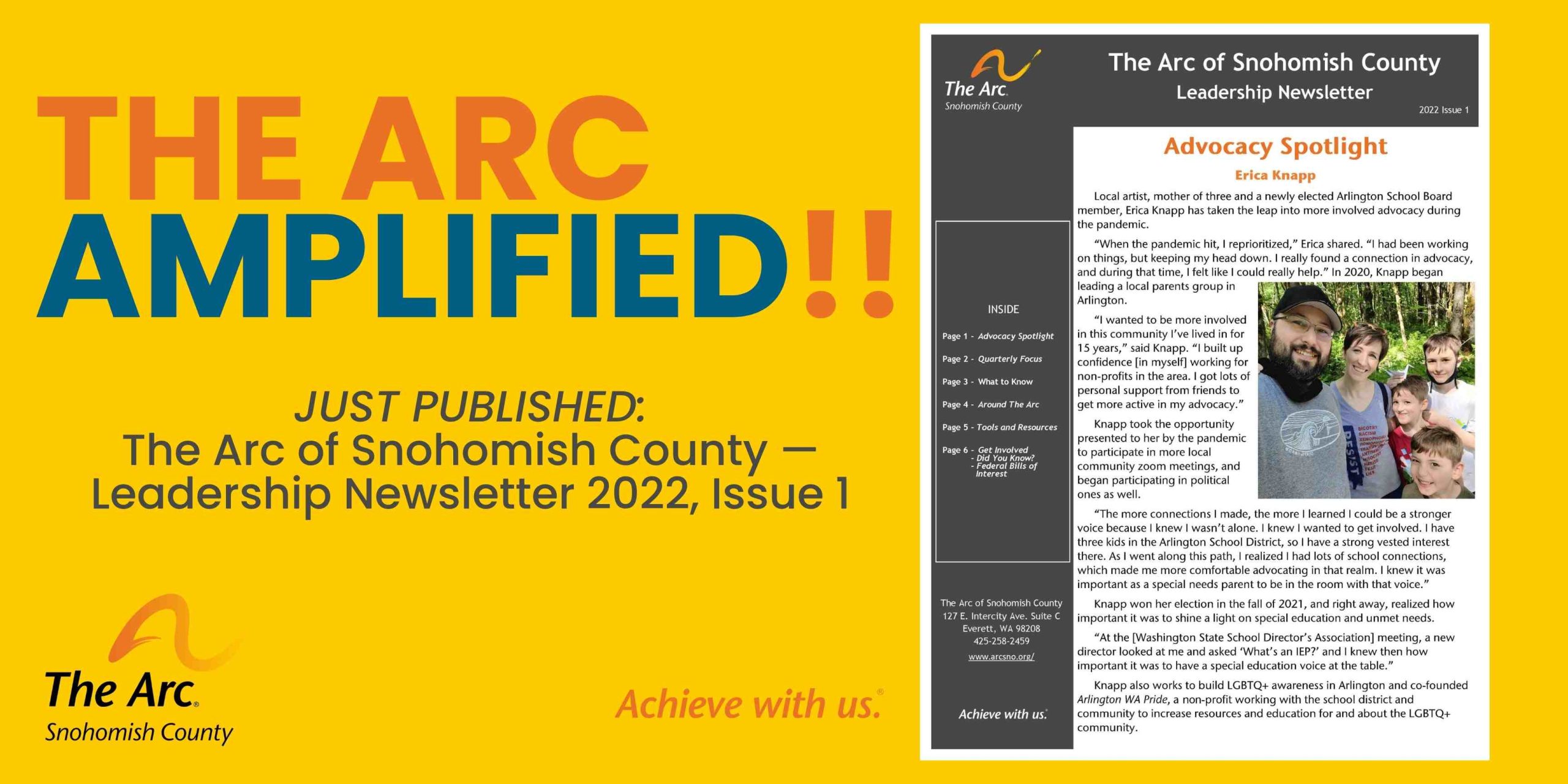
JUST PUBLISHED:
THE ARC OF SNOHOMISH COUNTY — LEADERSHIP NEWSLETTER 2022, ISSUE 1
The Arc of Snohomish County’s first Leadership Newsletter of 2022 was published on April 19th and is available for public viewing.
This quarterly publication highlights the many accomplishments and happenings of The Arc’s leadership and advocacy team members, Arc community leaders, parents and caregivers, self-advocates and others. The publication also offers updated information on important legislation, tools and community resources.
To access this most recent issue, visit tinyurl.com/4d6s3pf8.
Recent Staff Promotions
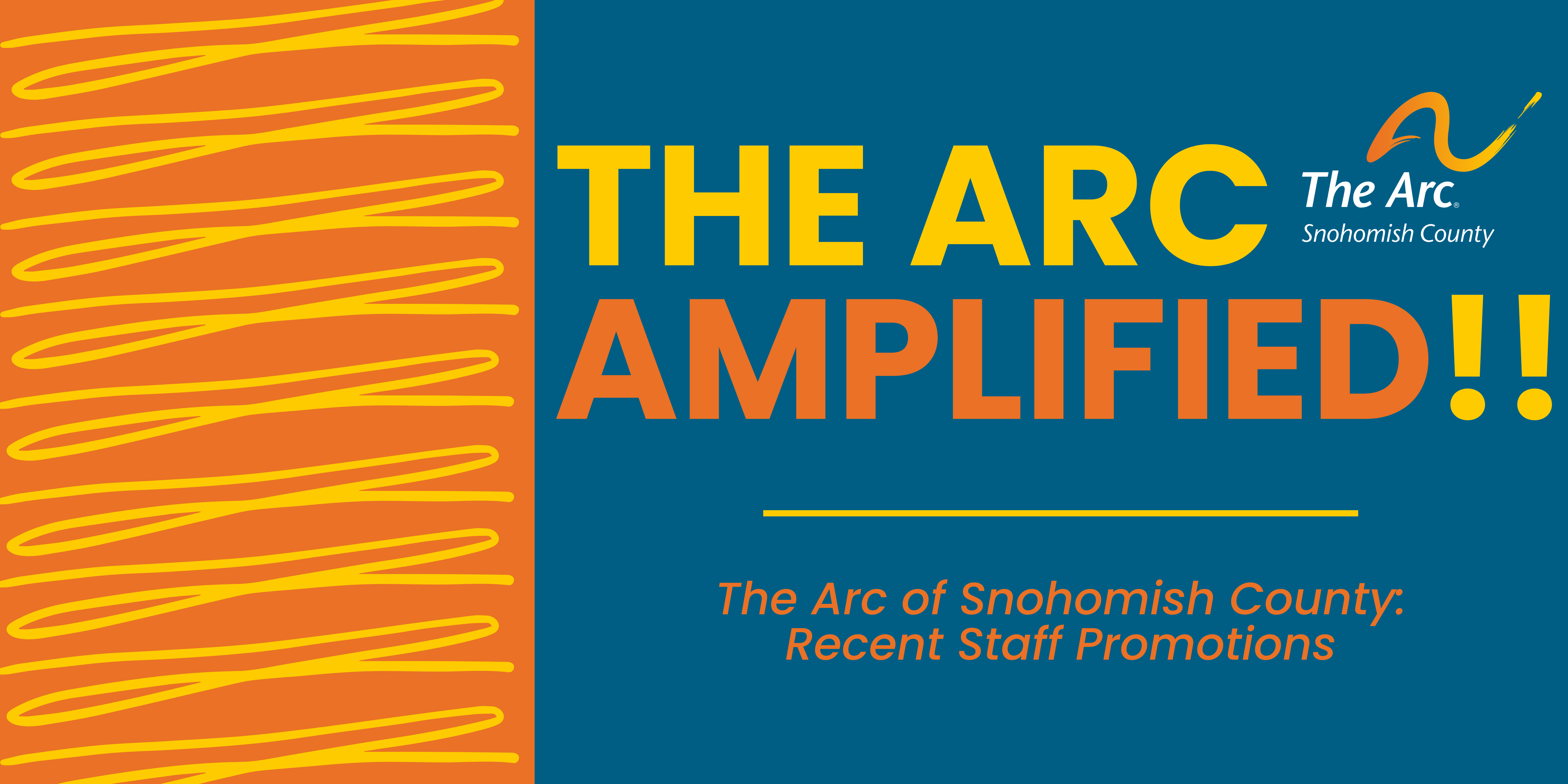
The Arc of Snohomish County: Recent Staff Promotions
The Arc of Snohomish County recently promoted Alaina Kube from her previous role as a Parent to Parent Coordinator to the position of Family Support and Education Program Manager. As a program manager, Alaina will guide projects and activities through The Arc’s Connecting Families program, including Parent to Parent and Sibshop programs, support groups, speaker events, and more. You can contact Alaina Kube at (425) 258 2459 ext. 111 or alaina@arcsno.org.
Whitney Stohr will also transition this month from her previous role as a Parent to Parent Coordinator to Leadership and Independent Living Program Manager. In this role, she will oversee leadership, independent living, self-advocacy and advocacy staff and programming. You can contact Whitney Stohr at (425) 258-2459 ext. 106 or whitney@arcsno.org.
We also look forward to welcoming new staff members in the upcoming weeks, who will support the Connecting Families and Sibshops programs. Stay tuned!
Meet Lily Sommer – Arc Sibshop Super Sib!

Meet Lily Sommer – Arc Sibshop Super Sib!
Lily Sommer is one of our Super Sibs at The Arc of Snohomish County.
She is 10 years old and is the middle sibling, with two brothers, ages five and (almost) twelve. Of being the middle sibling, Lily says: “It is tough and exciting because you’re not the one always getting picked on and not the one always getting told what to do.” Totally makes sense!
In her free time, Lily enjoys drawing and playing video games. Roblox is her favorite. She also likes Minecraft. She is “in love with animals.” In fact, her whole family are cat lovers! They have a pet cat named Nemo — as in the movie Finding Nemo.
Lily’s family also plays board games together. They like to spend time outside, as well. Sometimes, Lily and her brothers will play video games together.
Lily likes making new friends. She has a lot of friends, especially in school. She has also attended Arc Sibshops for some time. Lily shared that she feels that it is very important for kids to meet other siblings who have brothers or sisters with disabilities.
The Arc of Snohomish County’s Sibshop program is a specially tailored program for children, ages 8 to 12, and teens, ages 13 to 18, who have siblings with developmental disabilities. Learn more about the national Sibshop program at siblingsupport.org.
A tidbit of sibling advice from Lily: Make sure your siblings stay safe and that you watch them carefully.
**********
Whitney Stohr is a Parent to Parent Coordinator at The Arc of Snohomish County. She is passionate about advocating for medically complex children and children with disabilities and their families. She is a mom and medical caregiver herself, who is energized by working closely with other parent/family caregivers. She lives with her four-year-old son Malachi and husband Jason in Lynnwood. Connect with her on Instagram @rollin.w.spinabifida. Contact: whitney@arcsno.org.
National Siblings Day — April 10th
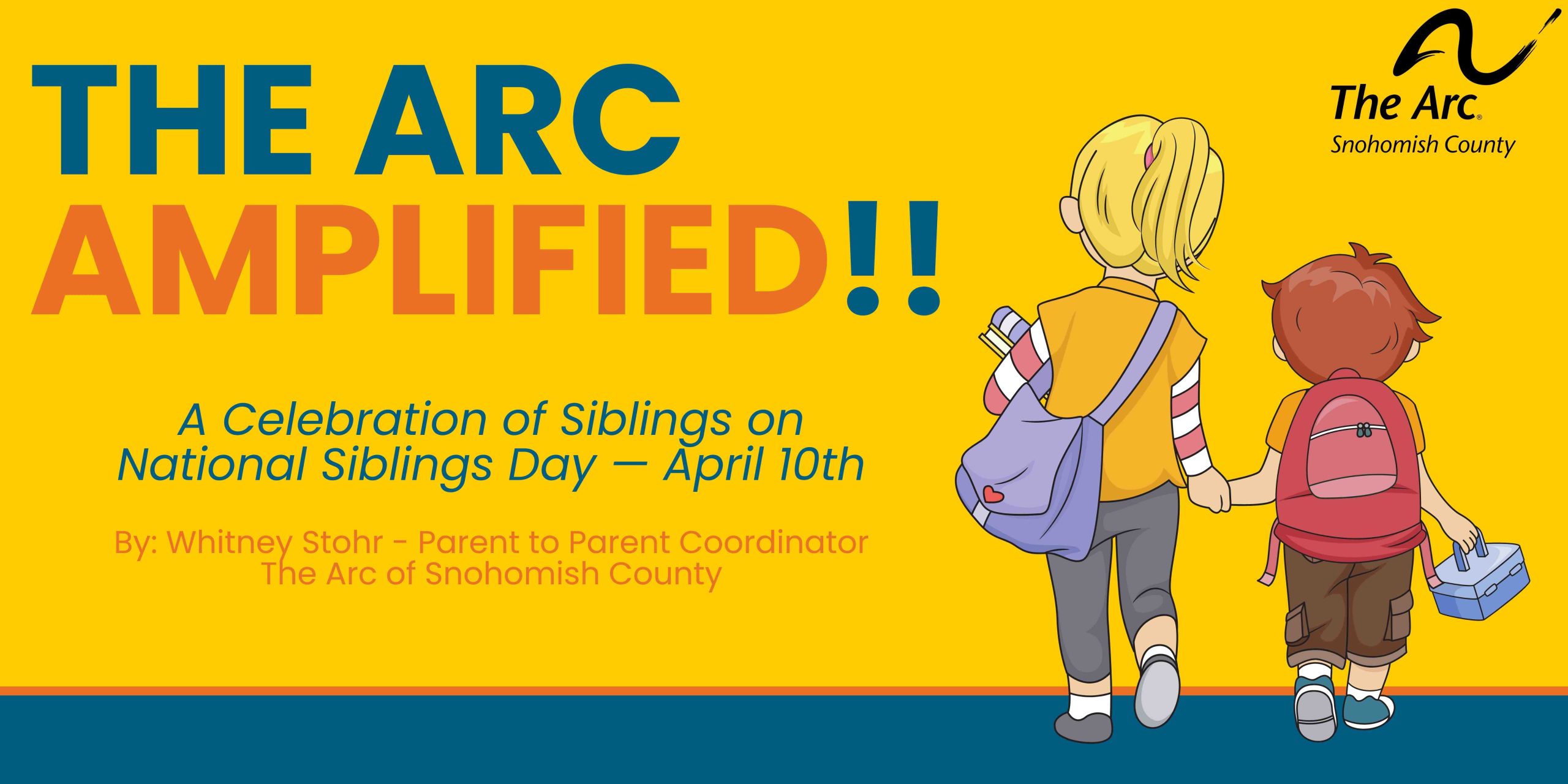
A Celebration of Siblings on National Siblings Day — April 10th
Let’s hear it for our SIBS!! On April 10th, we celebrate National Siblings Day!
According to the Siblings Day Foundation, “Siblings Day follows the spirit of Mother’s Day and Father’s Day, an uplifting celebration honoring people who have helped in our development and who have shaped our values, beliefs, and ideals.”
At The Arc of Snohomish County, we celebrate siblings every day! Through our Sibshops program, we support kids and teens, ages 8 through 18, who have a sibling with a developmental disability. The concept of Sibshops was founded through the work of the Sibling Support Project, a national program “dedicated to the life-long and ever-changing concerns of millions of brothers and sisters of people with special health, developmental, and mental health concerns.” (Learn more about the Sibling Support Project at siblingsupport.org.)
The Arc of Snohomish County currently offers Sibshops for siblings ages 8 to 12 and a Teen Sib program for youth ages 13 to 18. For information about upcoming Sibshops, visit our online event calendar at arcsno.org/calendar.
Additional support and resources for the siblings of children with disabilities can be found on the Sibling Leadership Network website: siblingleadership.org; and in the books and publications of the Sibling Support Project: siblingsupport.org/publications.
**********
Whitney Stohr is a Parent to Parent Coordinator at The Arc of Snohomish County. She is passionate about advocating for medically complex children and children with disabilities and their families. She is a mom and medical caregiver herself, who is energized by working closely with other parent/family caregivers. She lives with her four-year-old son Malachi and husband Jason in Lynnwood. Connect with her on Instagram @rollin.w.spinabifida. Contact: whitney@arcsno.org.
Weekly Goal Setting for Self-Care:
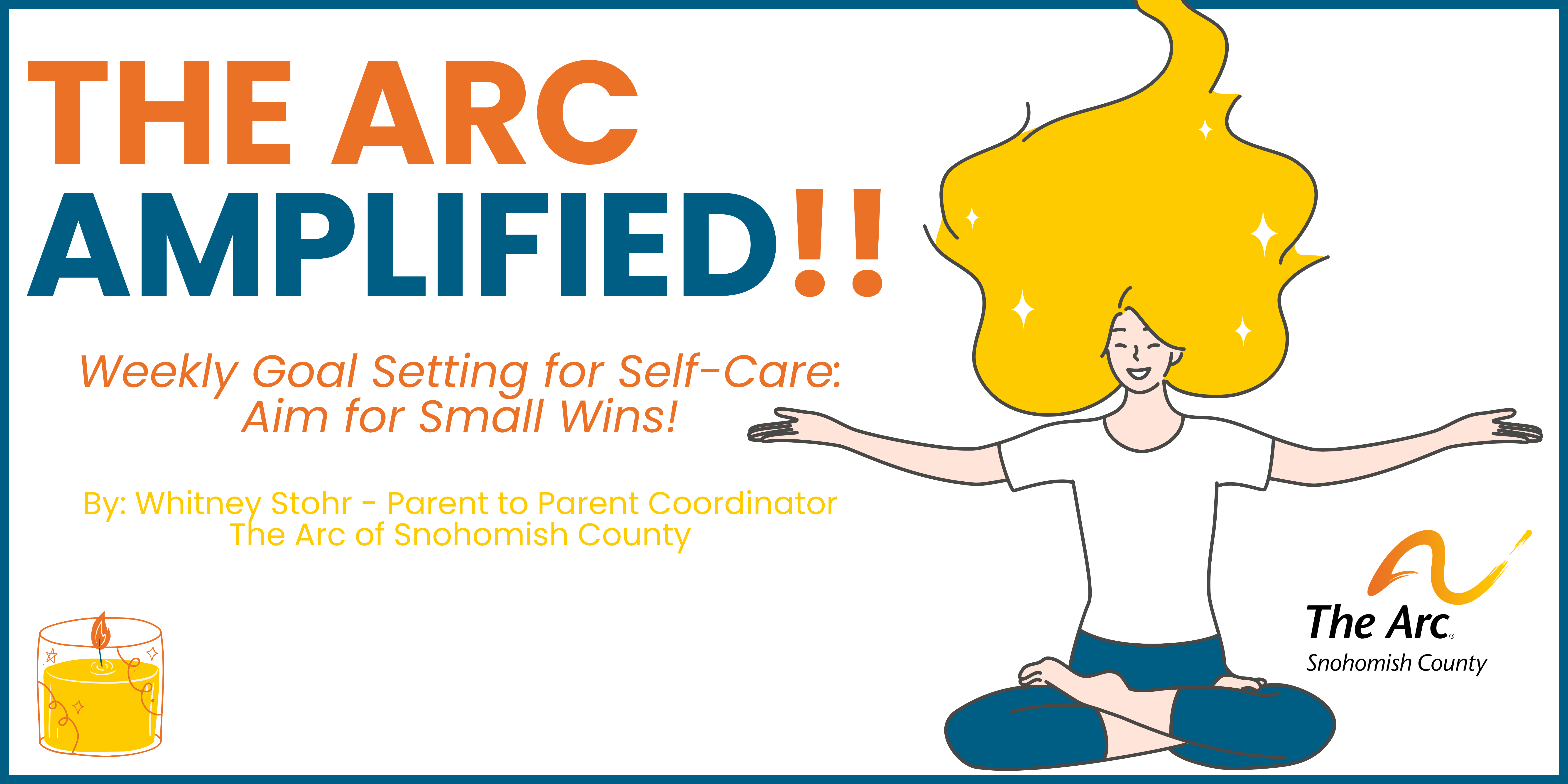
Weekly Goal Setting for Self-Care:
Aim for Small Wins!
As caregivers, we instinctually understand the importance of self-care.
We know how important it is to take care of ourselves. We may often hear phrases like “caregiver fatigue” and “caregiver burnout” from our children’s (or our own) care providers. The exhaustion of caregiving can feel relentless at times. The responsibility can feel so heavy, and, in those moments, we all know it!
Self-care, self-care, self-care… You know you need it! Of course you need it! And yet…
Everyone talks about self-care. It is an important topic for family caregivers. Self-care is essential in order for us to show up every day as our best selves — for ourselves, certainly, but also for our families, our kids, our partners and our communities.
And yet… For family caregivers, conversations around self-care always circle back to one, single issue: time.
It always comes back to finding the time for self-care, because…
How do you find time for self-care when caregiving alone keeps you running through your day?
How do you carve out time to prioritize your needs when you are responsible for meeting the needs of your children?
But, the answer is also just that: Time.
That is, we — as family caregivers — must find the time!
We must carve out moments to take care of ourselves.
And we all know this, too, but HOW??? How do you do it?!
You continually remind yourself that self-care is essential care.
You create a self-care mantra for yourself that you repeat over and over and over again until it sticks.
You set timers and daily calendar events for self-care because it should be a part of your day, every single day.
You discover whatever it is that works for you.
And then, you do it because self-care is really that important.
Start small! The goal, after all, is to establish a practice of continuous self-care that is sustainable and consistent over time. Caregiving is a long game, after all! (Click here for a previous blog post on the topic: “Creating a Self-Care Strategy in Three Steps”)
Another way to begin the practice of prioritizing self-care is to commit to one or two acts of self-care each day. In no way must these acts come anything close to grand gestures of self-love. Small — start small! These can be simple acts such as carving out time for a nightly skin care routine before bed or sitting outside by yourself for five minutes each afternoon before making lunch for the kids.
Simple acts of self-care.
That is the starting goal.
Here is a weekly self-care focused calendar to get your started.
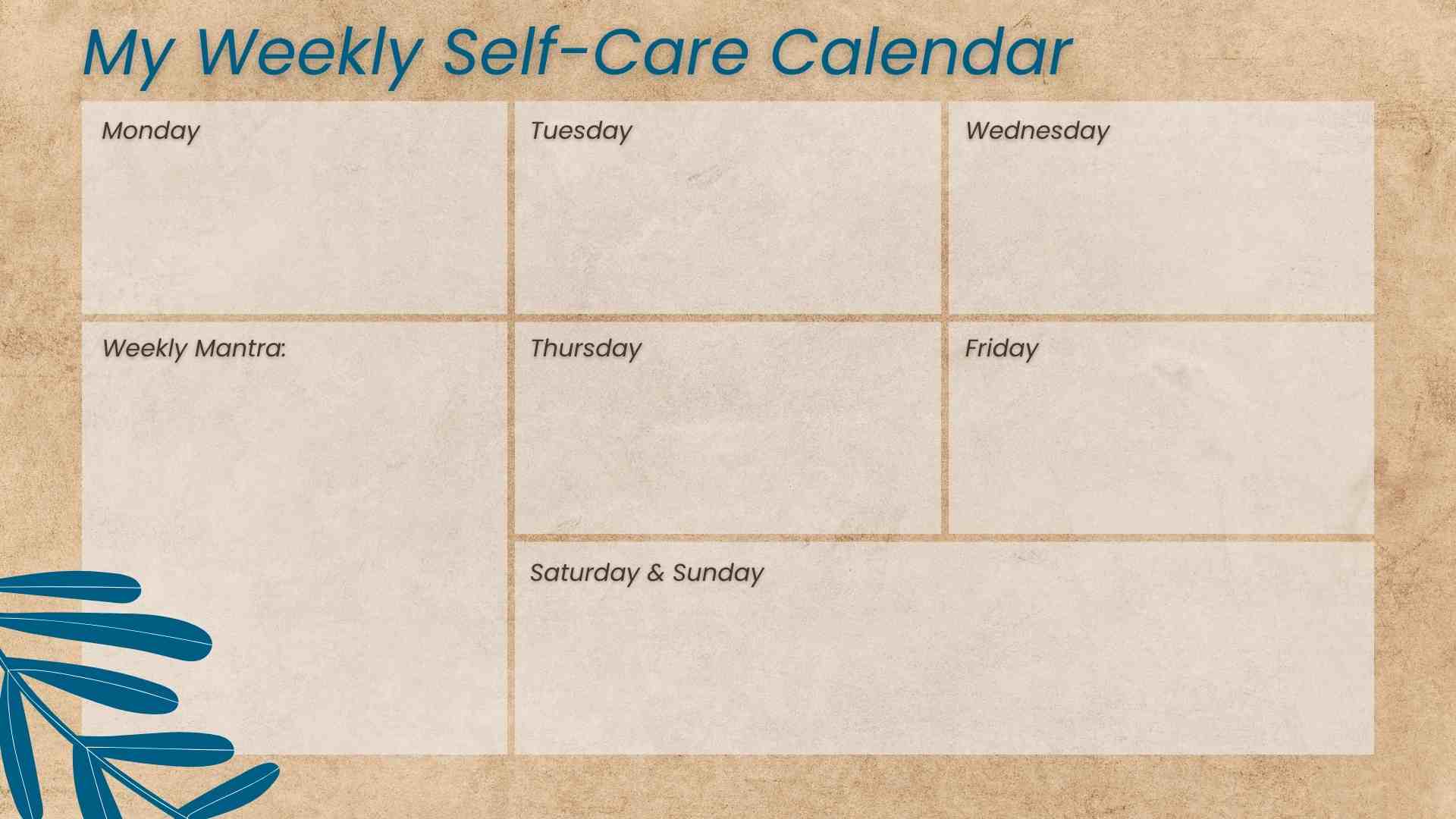
**********
Whitney Stohr is a Parent to Parent Coordinator at The Arc of Snohomish County. She is passionate about advocating for medically complex children and children with disabilities and their families. She is a mom and medical caregiver herself, who is energized by working closely with other parent/family caregivers. She lives with her four-year-old son Malachi and husband Jason in Lynnwood. Connect with her on Instagram @rollin.w.spinabifida. Contact: whitney@arcsno.org.
Child Abuse Prevention Month
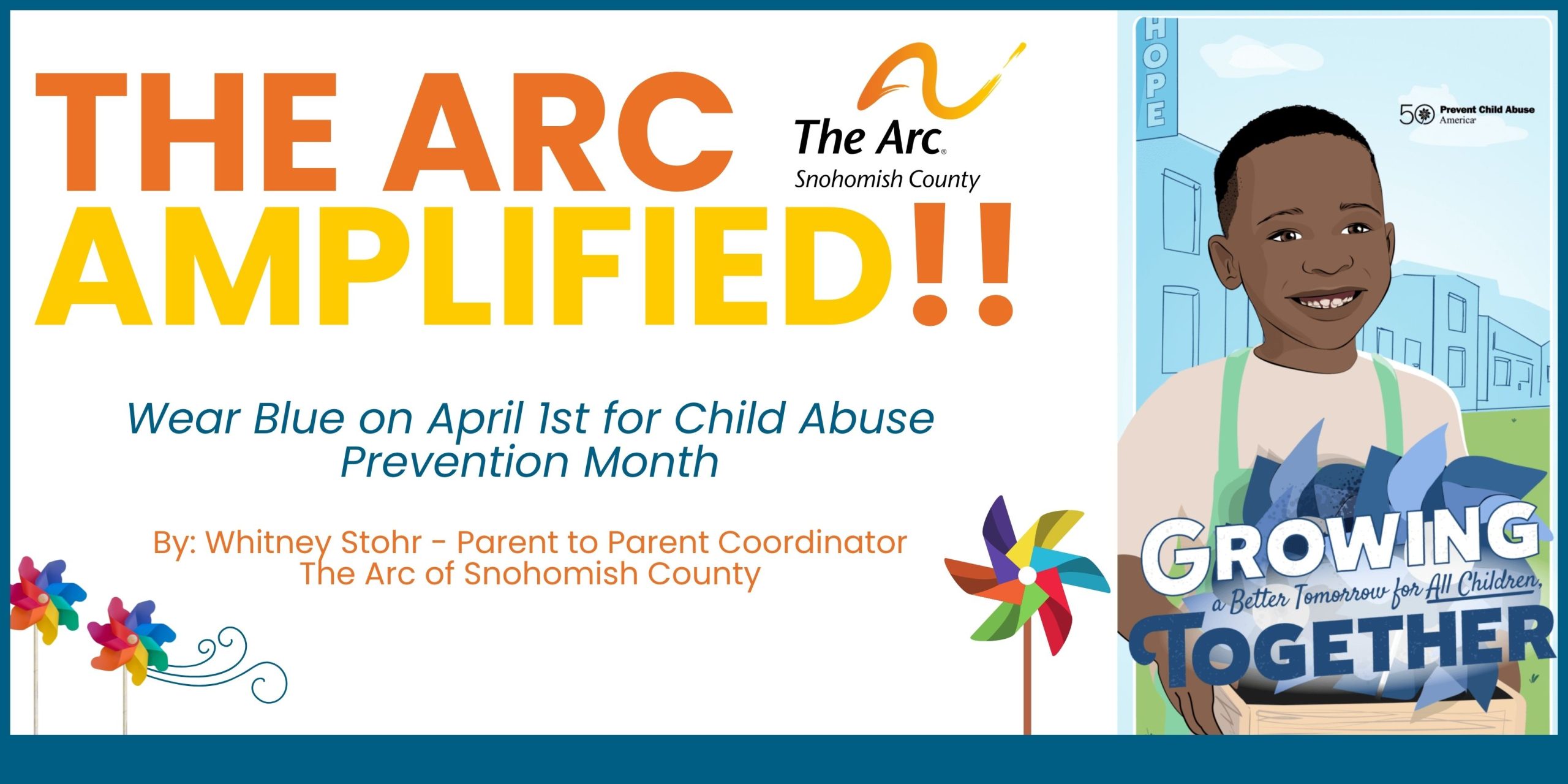
Wear Blue on April 1st for Child Abuse Prevention Month
The month of April is recognized nationally as Child Abuse Prevention Month.
Child Abuse Prevention Month is an annual observance for education and awareness raising around issues of child abuse prevalence and prevention. Informational events are typically held throughout the month of April and many organizations get involved.
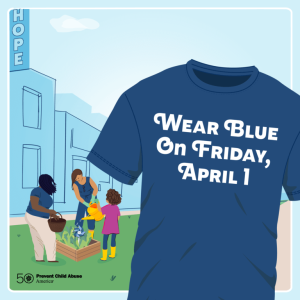 One way to help raise awareness is to participate in Wear Blue Day on Friday, April 1st. Wear your favorite blue outfit, snap a photo, and share on social media using the hashtag #WearBlueDay2022. Click here for ready-made social media posts from the national nonprofit Prevent Child Abuse America.
One way to help raise awareness is to participate in Wear Blue Day on Friday, April 1st. Wear your favorite blue outfit, snap a photo, and share on social media using the hashtag #WearBlueDay2022. Click here for ready-made social media posts from the national nonprofit Prevent Child Abuse America.
Prevent Child Abuse America is also hosting a Digital Advocacy Day on Wednesday, April 27th. Click here if you are interested in learning more about digital advocacy and how to participate.
The symbol for Child Abuse Prevention Month is the pinwheel.
The Washington State Department of Children, Youth and Families (DCYF) shared that, this year, on March 31st, thousands of blue and silver pinwheels will be planted on the grounds of the state capitol building in Olympia, as part of a national “Pinwheels for Prevention” campaign. Additionally, close to 15,000 pinwheels were distributed to organizations across the state to support their awareness programs.
Child abuse prevention programs are particularly important within the disability community as individuals with intellectual and developmental disabilities are significantly more likely to experience abuse than people without disabilities. Click here to access a Resource Guide, created by The Arc of Spokane’s Sexual Abuse Awareness & Response Program, designed to support children, teens and adults with intellectual and developmental disabilities.
Additional Materials & Resources for Kids:
- WA DCYF “Protective Factors” coloring book: com/4vehjj8w
- WA DCYF annual “Child Abuse Prevention” coloring page: com/9632k4cw
**********
Whitney Stohr is a Parent to Parent Coordinator at The Arc of Snohomish County. She is passionate about advocating for medically complex children and children with disabilities and their families. She is a mom and medical caregiver herself, who is energized by working closely with other parent/family caregivers. She lives with her four-year-old son Malachi and husband Jason in Lynnwood. Connect with her on Instagram @rollin.w.spinabifida. Contact: whitney@arcsno.org.
If Joy is Medicine for the Soul, “Laughter Yoga” Could be the Prescription
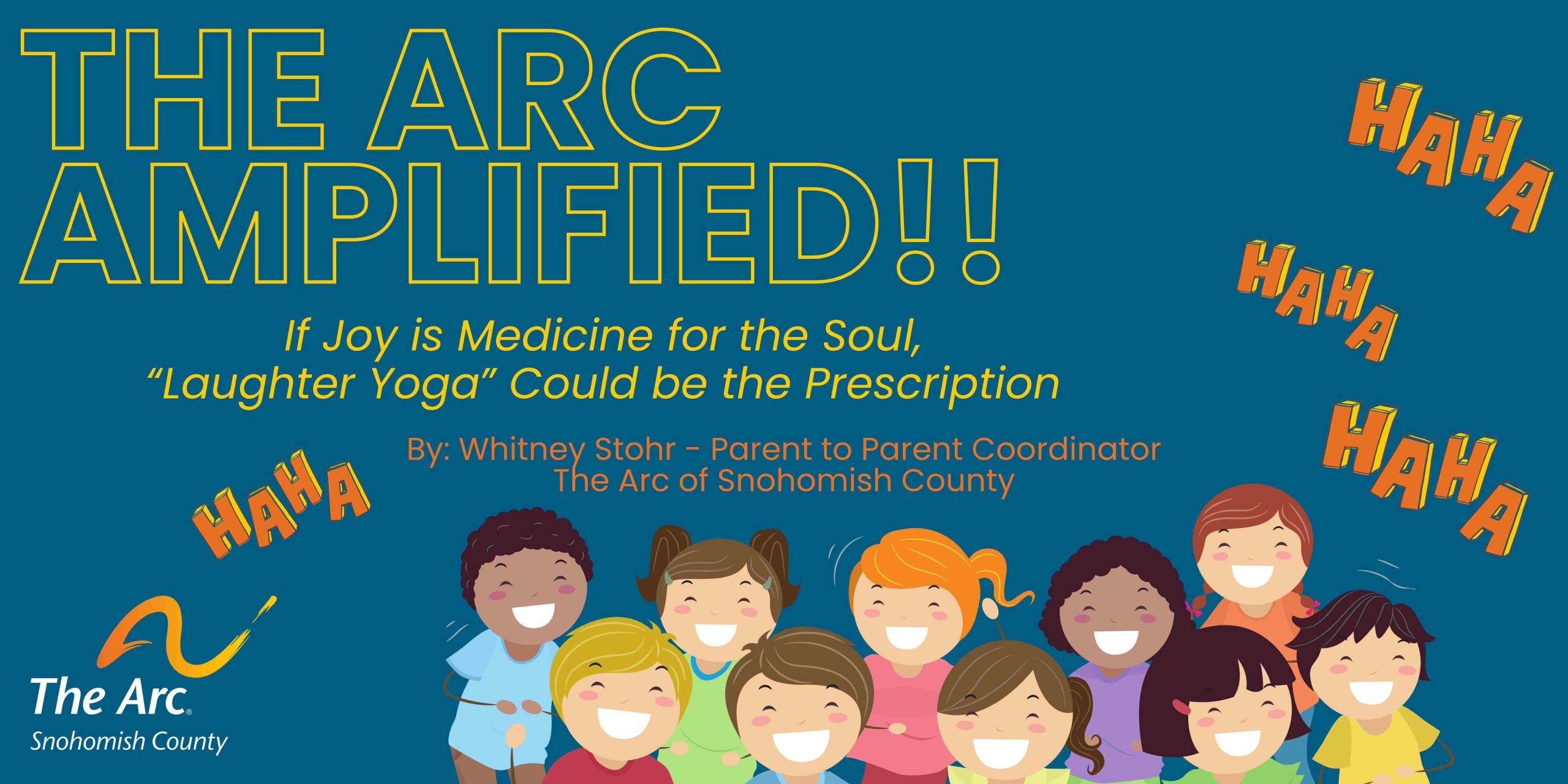
If Joy is Medicine for the Soul, “Laughter Yoga” Could be the Prescription
The Arc of Snohomish County welcomed Laughter Ambassador Julie Schreiber to lead a special “My Sib & Me” event, open to all Sibshop families, on Tuesday, March 22nd.
Julie is a Laughter Yoga Teacher, who received her certification in the practice in 2014, when she traveled to Bangalore, India, to train under Dr. Madan Kataria, founder of Laughter Yoga International. Julie also has a Master’s degree in Counseling from Antioch University and is now owner and founder of Connecting the Peaces, LLC, located in Issaquah. Today, Julie teaches Laughter Yoga classes, facilitates trainings and leads workshops for corporate events, nonprofit organizations and schools. (Click here to read the story of how Julie first learned about Laughter Yoga.)
What is “Laughter Yoga,” you ask? Laughter Yoga is an activity that uses laughter as an exercise to achieve health benefits. Different than the type of laughter evoked through humor, Laughter Yoga involves a practice of prolonging the type of loud and deep laughter that emanates from the diaphragm, for no comedic reason at all. You laugh simply to laugh! That laughter may then be combined with Yoga breathing exercises. Laughter Yoga sessions and social clubs, located in countries around the world, provide a safe environment where it is acceptable to laugh loudly and without restraint. (Click here to learn more about Laughter Yoga.)
What are the benefits of Laughter Yoga? Scientific studies show that laughter is beneficial to our health! It brings more oxygen into the blood and reduces stress. It increases endorphins and makes you feel better. It deepens breathing and can strengthen the immune system. Hearty laughter is similar to aerobic exercise. Sounds good, right?!
Learn more about Laughter Yoga with Julie at connectingthepeaces.com, or on her Facebook page: Laughing with Julie.
**********
Whitney Stohr is a Parent to Parent Coordinator at The Arc of Snohomish County. She is passionate about advocating for medically complex children and children with disabilities and their families. She is a mom and medical caregiver herself, who is energized by working closely with other parent/family caregivers. She lives with her four-year-old son Malachi and husband Jason in Lynnwood. Connect with her on Instagram @rollin.w.spinabifida. Contact: whitney@arcsno.org.
5 Ways to Make Easter Egg Hunts More Inclusive

5 Ways to Make Easter Egg Hunts More Inclusive
Each year, as the Easter holiday nears, popular stories and memes make their way around social media, describing ways that organizations or individual families have adapted their annual Easter egg hunts for greater accessibility and inclusion.
It is always fun to see on display the creativity and outside-the-box thinking of family caregivers and those community leaders dedicated to ensuring that everyone has a chance to participate in public events.
Some of these ideas include attaching helium-filled balloons to eggs, so wheelchair users can participate by grasping the strings of the balloons from their seated position. (If you are part of an organization that would like to recreate this idea: Consider using Mylar balloons rather than traditional party balloons as rubber balloons pose a health risk for children with latex allergies.) There have been stories shared about using beeping or light-up eggs to make egg hunts more inclusive for children with low-vision. Additionally, sensory-Friendly egg hunts can support kids and families who prefer calmer environments. (Click here for even more ideas!)
Here are additional steps that organizations can take to make their upcoming Easter egg hunts more inclusive:
1. Utilize a variety of surfacing
When marking the boundaries of your Egg hunt, identify a space that includes a variety of ground surfacing such as ample sidewalk space and areas with solid ground surfacing, in addition to the usual grassy fields. It can be difficult for children who use wheelchairs or other mobility aids to participate in activities that take place in grass or areas with loose ground material like gravel or sand.
2. Hide eggs at varying heights
Children who are wheelchair users will have a difficult time participating in an egg hunt where all the eggs are placed at ground-level. Other children with disabilities, for a variety of reasons, may also find it challenging to reach for such low set items. Instead, identify a location for your Easter egg hunt that allows eggs to be placed at different heights. For example, include a playground area or draw your boundaries to meet the outside walls of an adjacent building, with all it nooks and crannies. (Remember that access to these spaces should also be accessible with ramps, curb-cuts and/or paths made of hard ground surfacing.)
3. Establish adaptive categories for participation
For large egg hunts, dividing participants into traditional age categories can prove problematic. This inevitably places some children with disabilities at a distinct disadvantage as they must contend with various barriers to access between themselves and the eggs they wish to collect. Fun, community activities, like Easter egg hunts, should be designed in a way that creates an equitable opportunity for participation by all involved. Creating a category of adaptive participation, or establishing participation categories based on level of self-selected “competitiveness” can make the event more fun for everyone. For example, participation categories could include: a “Just for Fun” walking-and-rolling category versus a more competitive “Egg Hunts Are My Business” category.
4. Offer non-food prize alternatives
Some children cannot eat by mouth and others cannot eat certain types of food items, which may include your traditional marshmallow bunnies and Cadbury eggs. It is always a good idea to offer non-food prize items at public events. Luckily, there are many options that fit perfectly inside of plastic eggs. Items to consider: stickers, temporary tattoos, small stamps, small figurines or finger puppets. (Click here for a list of “40 Egg-cellent, Non-candy Easter Egg Fillers”)
5. Provide ample seating for both participants and their family members
Providing quality seating (and enough of it!) at public events is an important consideration for accessibility and inclusion. Parents and grandparents love to cheer their little ones on as they go on the hunt to fill their basket with Easter eggs. To accommodate the needs of all participants, identify a space that offers built-in seating, such as park benches and ADA-Compliant picnic tables, or consider how additional seating can be provided. Such accommodations support the needs of children who require time to sit and rest after the exertion of physical activity, as well as other family members with disabilities or individuals who require restful spaces.
Here is wishing all who celebrate a very Happy Easter and a successful egg hunting season! May the bunny be always on your side!
**********
Whitney Stohr is a Parent to Parent Coordinator at The Arc of Snohomish County. She is passionate about advocating for medically complex children and children with disabilities and their families. She is a mom and medical caregiver herself, who is energized by working closely with other parent/family caregivers. She lives with her four-year-old son Malachi and husband Jason in Lynnwood. Connect with her on Instagram @rollin.w.spinabifida. Contact: whitney@arcsno.org.

